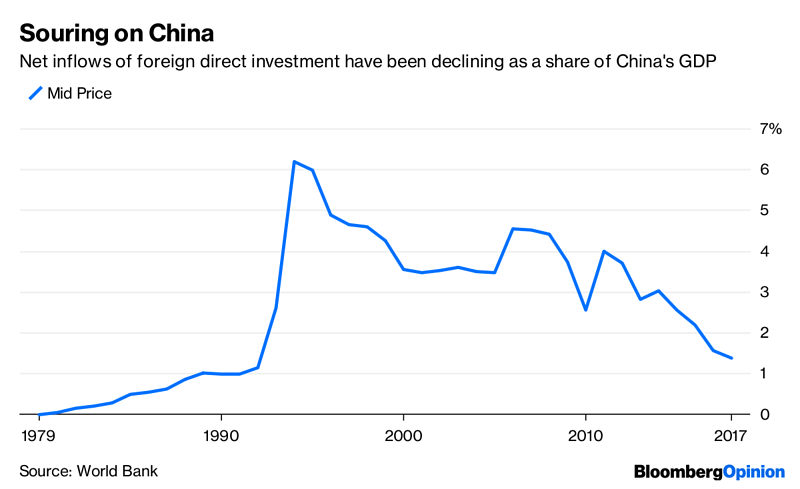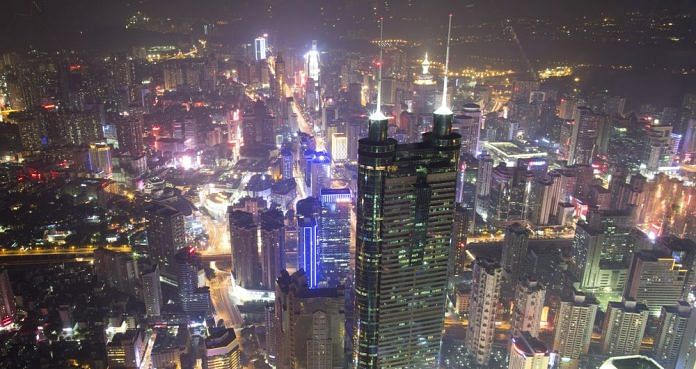By taking all the credit for the country’s stunning economic rise, the Communist Party is threatening its continued prosperity.
Nobody can know if, when Deng Xiaoping launched his strategy of “Reform and Opening Up” 40 years ago, even he could have predicted the near-miraculous transformation of the Chinese economy that would follow. In the years since then, hundreds of millions have been lifted out of abject poverty and into the ranks of the global middle class; China’s industrial heartland became the workshop of the world; and the People’s Republic has muscled its way into the first rank of global powers.
Yet the tone with which Chinese Communist Party functionaries look back on this performance grates — and for good reason. China’s leaders view the country’s rise with a certain smugness: as a vindication of their model of governance, their form of state capitalism and their obsession with control. Meanwhile, the rest of the world is slowly coming to the realization that the Party and its model don’t deserve all or even most of the credit.
The primary drivers of this economic miracle have been the industrious and entrepreneurial Chinese people — from those who took a chance on township and village enterprises early on in the reform process, to the migrant workers who labored under unrewarding conditions to build the vast industrial complex that is the Pearl River delta, to those who, today, sit in smart Shanghai coffeehouses doodling high-tech business plans on napkins.

At the same time, many acts of omission and commission by the rest of the world also contributed to China’s success — and the world is realizing now that it hasn’t exactly been paid in full for its contribution. Corporations from across the world decided to bet on China and poured in the vast amounts of foreign investment — other people’s savings — that transformed the country into the world’s last industrial superpower. And governments took the considered decision to look aside while Beijing’s leaders gamed the global trading system — in the hope that “engagement” and the prosperity that ensued would lead to a more liberal, freer and more globally integrated China.
This implicit bargain — that the world’s investors would be able to make money in China and that the world’s governments would see at the end of the process a China they could work with — has been broken. Perhaps it was always an optimistic vision, but under the leadership of Xi Jinping it has become clear that it is beyond saving. Companies worry they will be locked out of the benefits of the next stage of China’s growth; countries have to deal with a giant that’s far more resentful and aggressive than they’d expected. It’s hard to argue with the widespread notion that what China is celebrating is 40 years of opening up other countries, not its own.

Economically, at least, one could argue that China’s turn inwards is a mistake. However great the potential of its domestic market, the sort of high-tech innovation that it’s counting on to move up the next step on the economic ladder requires global scope to truly pay off: There’s no point dominating research into artificial intelligence or machine learning if it doesn’t result in profits from applying that knowledge across the world.
Nor will China succeed as a source of infrastructure finance without a more globally-integrated and open financial system, and the granular appreciation of risk that such reform would bring. The Belt and Road Initiative was intended to export Chinese capital and excess capacity to parts of the global economy where they could earn higher returns. Instead it will wind up importing risks and insecurities from those regions back to the Chinese system.
A little more humility from the Communist Party about its role in China’s economic transformation would serve the Chinese people well. The growing troubles of Huawei Technologies Co. come at an apposite time; they serve as evidence that, just like the 40 years just passed, the next decades of Chinese growth will also require buy-in from the rest of the world.
By taking credit for China’s growth, the Party seeks to bolster its increasing authoritarianism and aggressiveness. Instead, if it better appreciated the role of the rest of the world in that success, Beijing would seek accommodation and compromise with its rivals and peers. And if it remembered that the true and ultimate source of the Chinese miracle, unparalleled in the history of the world, is the passion and commitment of China’s people, it would seek more and different ways to empower them. – Bloomberg




Narendra Modi is the real asset as a prime Minister. India as a Nation excelled a lot under his leadership. He is an honest man and a patriot . All the projects launched by him are running smoothly. From Sabarmati river in Gujarat front to Bogibeel bridge in Assam via Varanasi we can experience rapid development from 2014 to 2019 . From Chenani Nasri Tunnel in Jammu and Kashmir to Sagarmala in South India via Solar plant in Karnataka everything is Modi magic . Don’t think elect him again.
The difference that I see between China and other nations is that most capitalist economies drive money making by gambling/trading without producing corresponding goods and services. I consider the gambling/trading in stock/commodity/currency market as the key reason for economic failures and uncertanities. China on the other hand does not encourage gambling/trading on such things and focus on producing goods and services. Obviously, the exchange rate advantage is always there compared to Western countries. The world will move towards a single global currency when people realize the advantage/disadvantage of multiple currencies and exchange rates.
While the article is generally correct, the tone and tenor are slightly misplaced. The world did not take a considered decision that China’s economic reforms will lead to political reforms and freedom. Like all such decisions, it was motivated by greed and self-interest. It is another matter that the Communist Party proved smarter.
Wouldn’t a little humility from the Trump administration be wonderful for the world as well …
The Chinese have justified the bet the world took on their eventual success. The rest of the world, led by the United States, needs to start a new dialogue with the dragon, pointing out the areas where the Chinese need to pay their fair share, starting with greater access to their market, respect for the rules of the road, a less threatening posture in their neighbourhood. That said, no power on the planet can impede the continuing rise of China, of its economy becoming al out as advanced and innovative as America’s. Neither the trade war, nor the larger enterprise of containing China, is good for the world. The global economy needs the powerful engine China’s economy has become to stay airborne. Internal political developments are something the Chinese people have to resolve with their government.